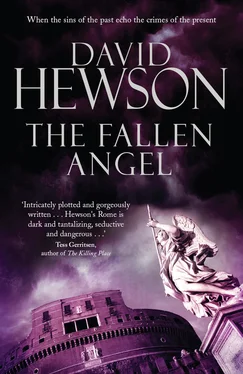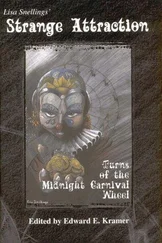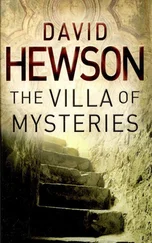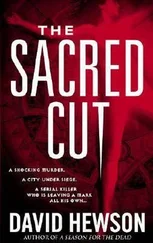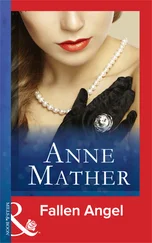David Hewson - The Fallen Angel
Здесь есть возможность читать онлайн «David Hewson - The Fallen Angel» весь текст электронной книги совершенно бесплатно (целиком полную версию без сокращений). В некоторых случаях можно слушать аудио, скачать через торрент в формате fb2 и присутствует краткое содержание. Жанр: Триллер, на английском языке. Описание произведения, (предисловие) а так же отзывы посетителей доступны на портале библиотеки ЛибКат.
- Название:The Fallen Angel
- Автор:
- Жанр:
- Год:неизвестен
- ISBN:нет данных
- Рейтинг книги:5 / 5. Голосов: 1
-
Избранное:Добавить в избранное
- Отзывы:
-
Ваша оценка:
- 100
- 1
- 2
- 3
- 4
- 5
The Fallen Angel: краткое содержание, описание и аннотация
Предлагаем к чтению аннотацию, описание, краткое содержание или предисловие (зависит от того, что написал сам автор книги «The Fallen Angel»). Если вы не нашли необходимую информацию о книге — напишите в комментариях, мы постараемся отыскать её.
The Fallen Angel — читать онлайн бесплатно полную книгу (весь текст) целиком
Ниже представлен текст книги, разбитый по страницам. Система сохранения места последней прочитанной страницы, позволяет с удобством читать онлайн бесплатно книгу «The Fallen Angel», без необходимости каждый раз заново искать на чём Вы остановились. Поставьте закладку, и сможете в любой момент перейти на страницу, на которой закончили чтение.
Интервал:
Закладка:
‘I would really appreciate it if you came with me tonight,’ she said with a sudden, earnest intent. ‘It could be in your interest, just as much as mine.’
He looked around. They were outside the Questura, in the Piazza San Michele, beyond the tiny crowd of demonstrators still waving banners in support of Mina Gabriel and women’s rights.
‘Are you looking for Riggi?’ he asked straight out.
She raised her trim shoulders slightly and frowned.
‘Him. And Robert Gabriel.’ He watched as she tried to stifle the briefest moment of embarrassment. ‘Why do I tell you things I’m not supposed to? Things I don’t tell anyone else?’
‘I imagine because you want to.’
‘Yes,’ she said, exasperated. ‘But why?’
He shrugged and waved the phone.
‘Got to make a call. Private. Where do you start and when?’
‘The Coyote. Seven. You know it?’
‘Oh yes. I’ll be there.’
‘Thanks.’
She started to walk away. He caught her arm gently.
‘Does Riggi have any idea he’s under investigation?’ Costa asked. ‘And that you’re the one who’s trying to nail him?’
Rosa looked worried, uncertain of herself, and that was rare.
‘I wish I knew. He’s a slippery bastard. I’ve been with him for a month now. I don’t know half the people he deals with. What he does most of the time.’
He thought about this and asked, ‘What about Robert Gabriel? Have you met him?’
‘Met him? I haven’t even seen him. Riggi insists he deals with the English kid alone. No one else goes near.’
‘Thanks,’ he said, and watched her go.
He looked at the phone. There was a missed call from a number he recognized. He returned it, heard Agata answer, and the relief in her voice, followed quickly by indignation.
‘You never called,’ she said.
He closed his eyes and rested his head against the battered stone wall of the Questura.
‘It’s only been a day. Also, I seem to be back at work. Sorry.’
He didn’t say what was in his head: this wasn’t a good idea, she was better off if he stayed out of her life.
‘Can you come round, please? Now?’
He felt tired and grubby. His head ached. Costa checked his watch, calculated he had forty minutes before the appointment with Rosa at the Coyote, took a deep breath and said, ‘Of course.’
TWO
Five minutes later he was in the Via Governo Vecchio dragging his scooter onto its stand. He got a lascivious wink from the old woman who was once again sweeping up outside as he knocked on the door of the ground-floor apartment. Agata answered the door still in her office clothes: a smart blue suit. She didn’t look him in the eye as she let him in.
The place was a beautiful little studio, an elegant home packed into no more than a hundred square metres. A gigantic print of Botticelli’s Venus ran along the main wall. A tiny kitchen was tucked into the far corner. The timbered floor was covered in fashionable ethnic rugs. At the end of the room an open staircase with a banister led up to a double bed set in a gallery suspended directly over a small dining table. Once this had probably been no more than a storeroom for the house above. Now it was transformed into a sophisticated compact apartment just a few steps from the Piazza Navona, home to the young woman who sat opposite him, in front of Botticelli’s ill-proportioned goddess rising naked from her scallop shell, a pale, northern figure set against Agata’s darker, Sicilian features.
Something linked them, though. An expression of doubt, anxiety even, at the circumstances in which they found themselves.
‘How’s work?’ he asked. ‘Did you have a nice meal with your boss?’
‘I didn’t ask you here to talk about that,’ she said very quickly. ‘It’s this case of yours. That poor girl in the street. Mina Gabriel.’
Costa privately cursed the media and asked, ‘What about her?’
‘All this talk about Malise Gabriel and Galileo and Beatrice Cenci. This picture. .’
She had a copy of the evening paper, the one which had placed Mina’s features over the portrait in the Barberini.
‘You shouldn’t believe everything you read.’
‘Well, I might not, if I hadn’t heard it from your friends first.’
She looked unhappy. The way Agata had avoided talking about work — this wasn’t like her. She’d seemed so enthused by the idea of getting a job, one that was entirely about her first love, art.
‘I can’t really talk about a live case. I’m sorry.’
‘You already have talked about it. In a restaurant, of all places.’
She watched him from her plush chair on the other side of the coffee table. He wondered if a teacher’s wages would really pay for a place like this. It seemed unlikely.
‘On Sunday night,’ he said, ‘we still thought. . we hoped Malise Gabriel’s death was an accident. That seems less likely now, and Leo certainly has a confirmed case of murder which is obviously linked to the family. The American woman who leased them their apartment.’
Her eyes grew wide with shock and indignation.
‘Do you honestly think that poor girl could have been responsible for the murder of anyone? Let alone her own father? Or that a man like Malise Gabriel could have done such horrible things to his own daughter?’
Costa didn’t want this conversation.
‘Agata,’ he said. ‘The world’s full of truths we’d rather not face. Evil isn’t some dry, philosophical debate. Or at least not only that. It’s people. Ordinary people. Decent people, given another throw of the dice. You learn to live with it.’
‘I don’t want to live with it! I hate it. My world. .’ He caught her naive, slightly wild expression and saw again the young, innocent sister he’d first met, bustling through Rome in her black uniform, tackling everything she encountered with a fine, sharp intellect, but always from a distance, disengaged.
‘The world you lived in wasn’t real,’ he said, and hoped he hadn’t gone too far. ‘You looked at the rest of us from behind the walls of your convent. As if we were specimens. I’m sorry if people disappoint. They’re just human.’
Agata waved him away with an impatient arm.
‘You’re missing something here. An important point.’
She picked up the paper and stabbed a finger at the photograph of Mina, superimposed upon the frail, sad figure of Beatrice in Guido Reni’s painting from the Barberini.
‘This,’ she insisted, ‘isn’t reality. It’s myth, manufactured myth at that.’
He didn’t understand her point and said so.
‘Look.’ Agata walked over to the sideboard and picked up a blue folder full of documents. ‘I’ve been doing some research. Real research. Academic research.’
‘You’ve had time?’
‘I made time. I thought it was important.’ She flicked through the folder. ‘If Mina and her family are consciously trying to copy Beatrice Cenci they’re following in false footsteps, and they must surely know it. This painting for one thing.’
She retrieved a copy of the original portrait from the Barberini.
‘It’s not Beatrice,’ Agata stated with the same kind of certainty she’d possessed when evaluating the mysterious lost Caravaggio that had first brought them together.
‘According to the Barberini,’ Costa began.
‘I know what the Barberini say and they’re wrong. The best they should offer is an attribution. The work didn’t even appear in any known catalogue until the late eighteenth century, only thirty years before Shelley saw it and gave the Beatrice myth international appeal. Guido Reni probably never painted a single canvas in Rome until eight or ten years after her execution, so it can’t have been painted from life, whatever the guide books say. Stylistically too. .’ Her fingers ran across the original’s features. ‘I won’t bore you with the details but there are strong reasons to believe that not only is it not Beatrice, it’s not by Reni either.’
Читать дальшеИнтервал:
Закладка:
Похожие книги на «The Fallen Angel»
Представляем Вашему вниманию похожие книги на «The Fallen Angel» списком для выбора. Мы отобрали схожую по названию и смыслу литературу в надежде предоставить читателям больше вариантов отыскать новые, интересные, ещё непрочитанные произведения.
Обсуждение, отзывы о книге «The Fallen Angel» и просто собственные мнения читателей. Оставьте ваши комментарии, напишите, что Вы думаете о произведении, его смысле или главных героях. Укажите что конкретно понравилось, а что нет, и почему Вы так считаете.
